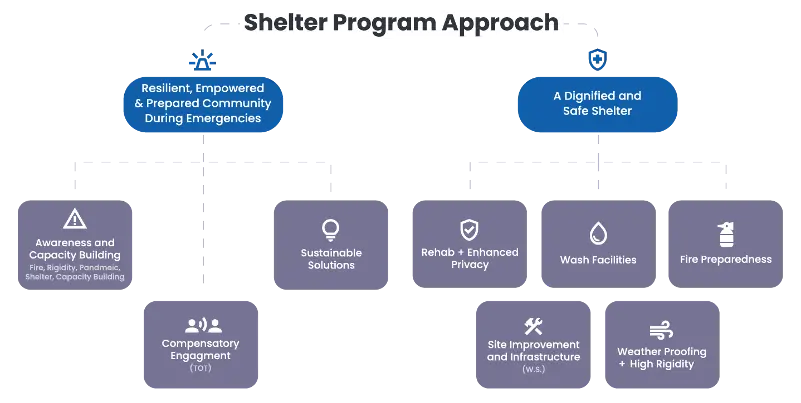Shelter and WASH
In 2020, UNICEF estimated that 91% of Syrian refugee families live below the poverty line, 88% of whom are below the extreme poverty line. This, in turn, contributes to families' preoccupation with finding other income alternatives such as sending their children to work. In June 2021, 49% of Syrian refugee families were food insecure. Thus, two-thirds of these families had to reduce the size of food portions or the number of meals they consumed daily. In addition to this, according to the UNHCR (2021) report, 60% of Syrian refugee families live in vulnerable or substandard housing.
-
Shelter and WASH Program Approach
-
Weatherproofing in informal settlements (IS)
-
Site Improvement
-
Emergency Response
-
Awareness Sessions
-
WASH Improvement
Other Programs
Home | Shelter and WASH Program Approach
Shelter & WASH Program Approach
In Informal Settlements
HAND’s shelter and WASH program aims to help vulnerable households in securing safe and adequate shelters, especially those residing in temporary shelters in Informal Settlements (ISs), as well as enhancing access to resilient, empowered, and prepared communities during emergencies.
HAND is responding to the needs of individual households by improving shelter conditions to create living spaces for women, girls, boys and men to feel safe, to live in privacy and security, as well as to mitigate health risks (both physical and psychosocial).
Our program places particular emphasis on life-saving interventions that address shelter requirements in informal settlements and marginalized urban or peri-urban areas through: Rehabilitation, WASH Improvement, Weatherproofing, Emergency Response, Site Improvement and Awareness sessions. We provide appropriate solutions and capacity building to engage the community in these interventions, ensuring their active participation and empowerment.
Achievements
2019-2023
Beneficiaries
Projects
Home | Shelter and WASH | Weatherproofing in informal settlements (IS)
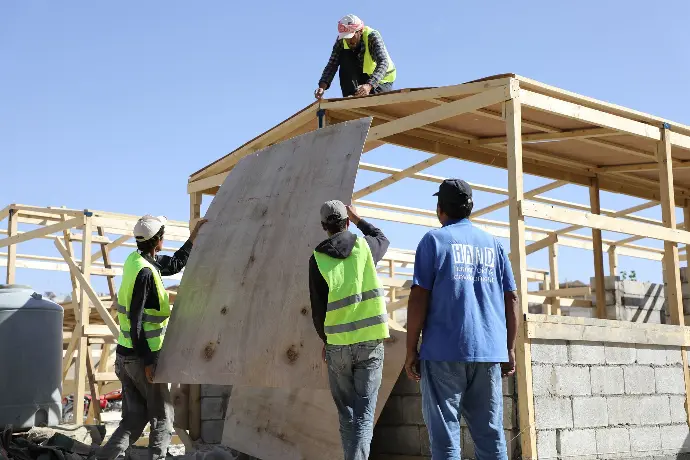
Weatherproofing in informal settlements (IS)
High Rigidity Shelters
In informal settlements, refugees face challenging living conditions in their temporary shelters. Issues such as the lack of integrity of the tent structure, lack of privacy, and severe damage to walls or ceilings pose threats to the residents.
To address these challenges, HAND have developed a new model of tents (“The Prefabricated Model”) built from the regular shelter kits distributed to households. Through our partnership with UNHCR, we have integrated this model to the annual weatherproofing in the national shelter sector framework, to address the shelter needs of refugees residing in Informal settlements (ISs) through the provision of durable, improved and weather-resistant shelters to help them withstand shocks and emergencies.
A carpentry workshop was established to build durable, sustainable frames from standard MRK kits, two training programs (an inclusive program and a ToT program) were in place to equip individuals with the necessary skills to construct and maintain their shelters effectively, and installation of prefabricated shelter kits for households eligible for MRKs according to the annual unified assessment.
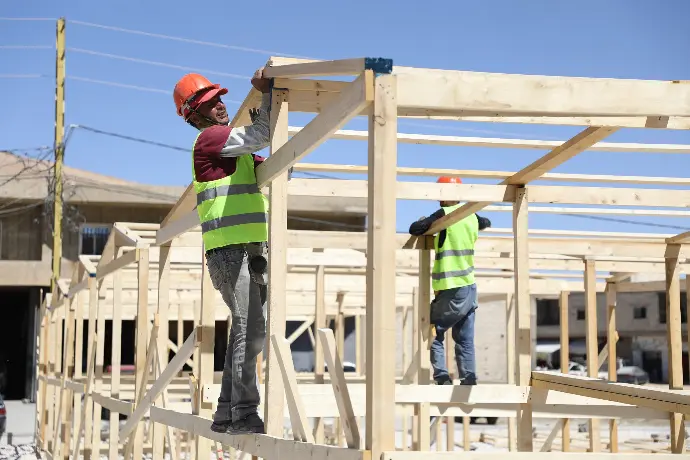
AHAND also is working with MEDAIR to enhance fire preparedness and awareness within informal settlements. This encompasses the distribution of fire extinguishers and the facilitation of fire awareness sessions. By equipping ISs residents with essential firefighting tools and knowledge, we aim to mitigate the risk of fires and minimize their devastating impact on the community. Additionally, these awareness sessions serve to educate individuals on fire prevention techniques, early detection methods, and appropriate response strategies in the event of an emergency. Through these concerted efforts, HAND is committed to fostering a safer and more resilient living environment for refugees in informal settlements.
Home |
Shelter and WASH
| Site Improvement
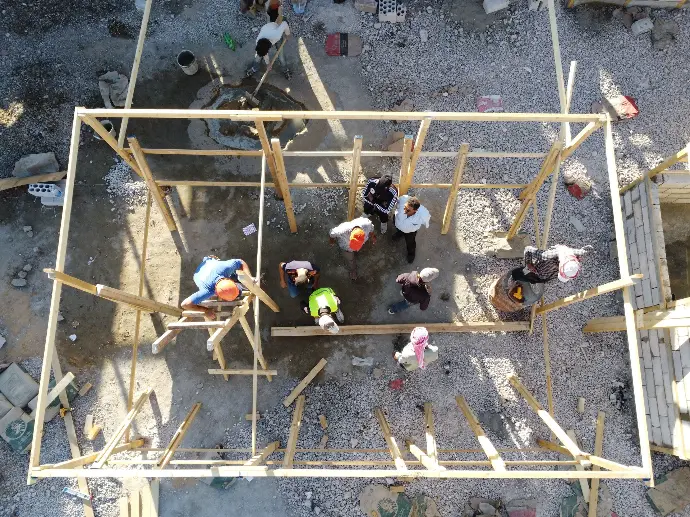
Site Improvement
Rising Above The Flood
Every year, natural hazards like floods invade thousands of tents and rob people of their homes. These disasters are exacerbated by the fragile and deteriorating infrastructure within informal settlements in Lebanon, leaving residents vulnerable to repeated crises. Recognizing the urgency of this situation, HAND has emerged as a pivotal responder.
Through site improvement interventions, HAND worked to enhance the resilience of people living in informal settlements. This includes upgrading WASH facilities at the settlement level, as well as implementing measures such as graveling and elevating the ground to mitigate flooding risks. All the selected actions were assessed and prioritized through Technical Site Assessments conducted by our engineering team in collaboration with beneficiaries.
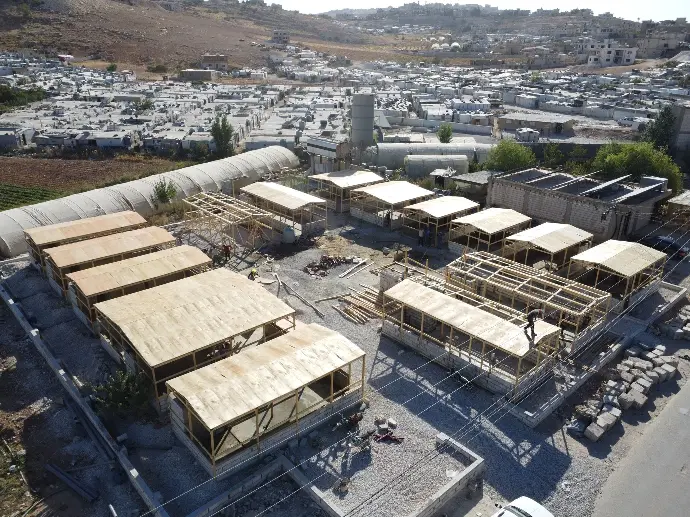
Moreover, community members have been empowered through training sessions on emergency referral procedures and flood prevention techniques. In addition to learning how to construct and maintain shelters, residents acquire essential skills to become more self-reliant in case of future challenges.
These projects represent a fundamental shift in humanitarian shelter responses, pushing the boundaries of traditional aid approaches. However, true transformation requires sustained community engagement and mutual learning, a process that demands time and dedication from all stakeholders involved. While there is much work ahead, the team remains steadfast in their commitment to realizing a sustainable and promising future for communities at large.
Beneficiaries
Home |
Shelter and WASH
|
Emergency Response
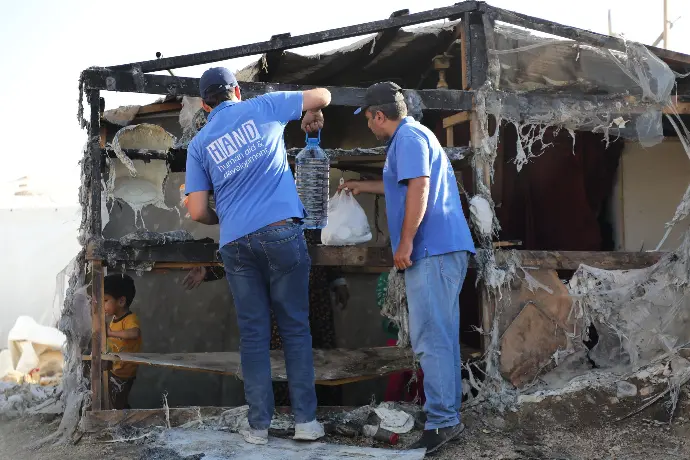
Emergency Response
On the Frontlines
As part of our dedication to save lives, HAND is holding the task of emergency responder in the most affected areas of Lebanon, through providing shelter services in cases of emergencies where shelters are affected, such as fires and storms. Upon receiving referrals from refugees or partners, we work in coordination with stakeholders to assess the situation and allocate the necessary resources. Our specialized team of engineers and technicians then develops an appropriate intervention plan tailored to the specific case.
In case of fire incidence, we reinstall the shelters and all the necessary WASH facilities. We also provide essential support, including CRIs (Core Relief Items) and food, to the affected families until the shelter is properly set up.
During environmental disasters, we repair damages in the shelters structure or distribute necessary kits to families, such as plastic sheets and wood, to ensure they have a safe place to stay.
Furthermore, within the local community, our emergency response team equips heavy machinery to clear snow-blocked roads in cities, facilitating the movement of residents to service centers. We also remove heavy snowfall within informal settlements to prevent water damage caused by melting snow and subsequent flooding of the shelters.
To find sustainable emergency solutions, we collaborate with state institutions and community initiatives involved in rapid emergency response, including civil defense. HAND provides necessary support for them including machines maintenance, training, and the provision of supplies and tools.
We also train refugees on how to document and send referrals in case of emergencies and coordinate closely with our ToT trainers to follow-up on the emergent cases.
Home |
Shelter and WASH
|
Hygiene and Health Awareness
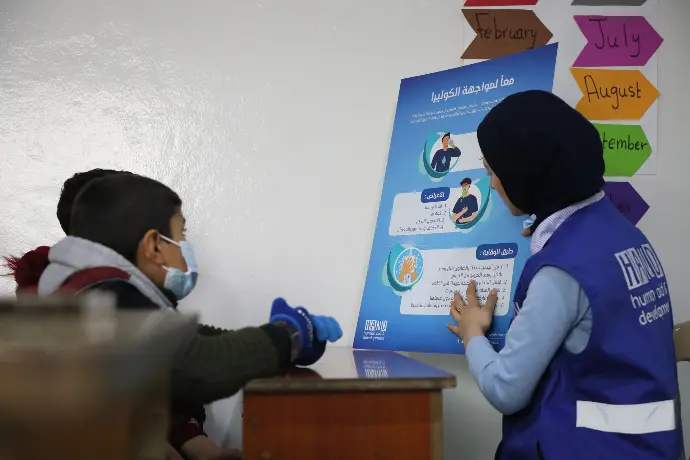
Hygiene and Health Awareness
Community Engagement and Capacity Building
HAND is promoting good hygiene practices and raising health awareness among individuals and
communities. We achieve this through the distribution of personal and household hygiene kits, as
well as educational/Awareness sessions focused on waterborne, and water washed diseases.
One of our primary objectives is to improve hygiene behaviour, particularly among children.
We recognize that addressing diseases is essential for ensuring a dignified life for all individuals,
regardless of whether they are in emergency or post-emergency situations.
HAND aim to empower children with the knowledge and skills necessary to maintain proper hygiene
practices. Through these initiatives, we hope to instill long-lasting habits that will contribute to
healthier futures for children and have a positive impact on the communities they belong to.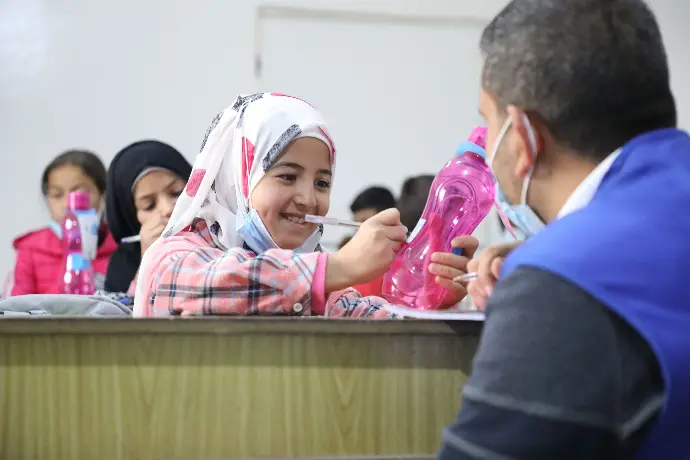
Home | Education | WASH Improvement
No Content
Write one or two paragraphs describing your product or services.
Write one or two paragraphs describing your product or services.
To be successful your content needs to be useful to your readers.
Start with the customer – find out what they want and give it to them.
Start with the customer – find out what they want and give it to them.
Other Programs
